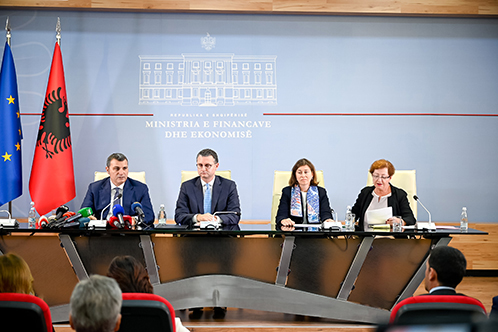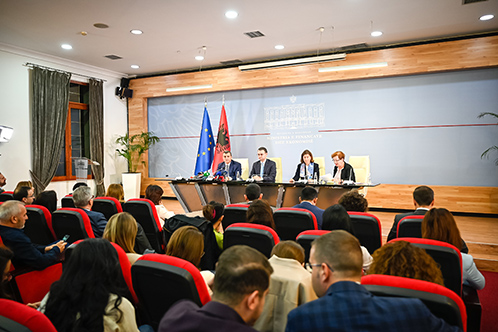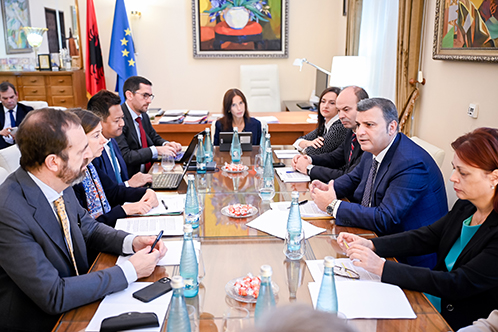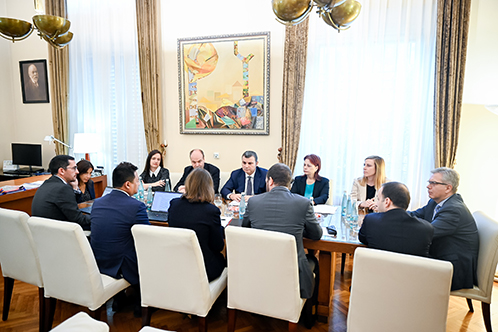BANK OF ALBANIA
PRESS RELEASE
Governor Sejko: Statement at the joint press conference with the IMF Mission Chief for Albania and the Albanian Minister of Finance and Economy, 27 October 2023
Publication date: 27.10.2023
Dear ladies and gentlemen,
Let me first thank the IMF Mission for the fruitful discussions we have had over the last two weeks in the framework of Article IV periodic consultations.

Concluding these discussions, I am pleased to note that we share similar views regarding the development stage of Albania, the challenges that lie ahead, as well as regarding the economic policies and structural reforms we should undertake to enable the fastest and most sustainable growth of Albania.
Following, I would like to address in more details the aforementioned issues.

The Albanian economy has performed positively over the course of last year, particularly in a challenging and unfavourable global context. This performance is felt in several directions:
- First, the continuous growth of economic activity, employment and wages, which in turn have improved the financial situation of the households and enterprises in Albania.
- Second, the considerable reduction of inflation rate from the high level recorded in the previous year. Inflation declined to 4.1% in September 2023, from 8.3% in October 2022. This performance displays a crucial progress for achieving price stability, although more work is needed to be done in this regard.
- Third, the resilience of the banking sector, which displays stabilised or improving capital, liquidity and profitability indicators. This sector has continued to supply the necessary funds for the growth of consumption and investments, making sure - at the same time - to preserve the Albanian households’ savings. Our analyses and stress tests results suggest that the banking sector appears resilient, even under possible stress scenarios.
- Fourth, the improved Albania’s external position, as reflected in the narrowed current account deficit and the reduced external debt. This development reflected the robust growth in tourism activity and the high foreign direct investments.
- Last, the improved fiscal position, reflected in both budget deficit and public debt edging down.

The positive economic performance has reflected the flexibility of the private sector, its financial soundness, and the adequate reaction of economic policies. In compliance with our objective, we have proceeded with the gradual and prudential normalisation of our monetary policy stance. The gradual increase of the policy rate towards its equilibrium level has aimed at establishing an adequate financial environment for inflation return to the target, within a reasonable time horizon and at the lowest possible costs for the Albanian economy.
The formulation of our monetary policy stance has also taken into account the rapid appreciation of the lek exchange rate against the euro and the fiscal consolidation implemented by public authorities. As we have continuously communicated, the fast appreciation of lek during this year has reflected a constant surplus of foreign currency in the domestic market, as a result of the sharp and robust growth in tourism, foreign direct investments and remittances. This factor has enabled us to maintain a lower level of policy rate, thus providing lower financing costs to the Albanian economy, and by easing the financial burden on borrowers.

So far, the effects of our monetary policy are encouraging. The monetary policy reaction has helped both control inflationary expectations and the smooth operation of financial markets, by creating the necessary premises for inflation to return to the target. Albania has recorded and continues to have one of the lowest rates of inflation and one of the highest rates of economic growth in the region.
The outlook for Albania's development remains positive. Our forecasts suggest the Albanian economy will continue to grow in the coming years, while inflation will return to the 3% target over the next year. This forecast factorises the further decline of inflation across our trading partners and a more balanced performance of demand and supply in the economy.
Nevertheless, our analyses show the persistence of the high domestic inflationary pressures, while the rekindling of geopolitical tensions in Middle East has the potential to strengthen risks to inflation. Therefore, we remain committed to react towards the further normalisation of monetary policy stance in the future.
Our primary objective has been and continues to be the return of inflation to the target. We aim at meeting this objective in a timely manner and at lowest costs for the Albanian economy. Accordingly, we will maintain a new data -dependent and balanced factors approach that impact inflation, particularly being attentive to the performance of prices across international markets, the performance of the exchange rate, the performance of wages and production costs, as well as the fiscal policy direction.
In a longer-term perspective, the Bank of Albania deems that the strengthening of the growth pace and sustainability of Albania calls for the continuation of structural reforms. The latter should primarily aim at bolstering productivity and competitiveness of the economy and should be increasingly anchored in the European integration process.
Within its domain of expertise, the Bank of Albania remains committed in:
- safeguarding the stability and further development of the banking system, through guaranteeing its prudential regulation and supervision, as well as through cooperating with the relevant authorities for the development of other segments of financial markets;
- promoting formalization and enhancing financial education and financial inclusion. To this end, the drafting of the national strategy on financial education, the modernisation of payment systems, and the increased level of electronic payments is a starting point of this process;
- supporting the European integration process through the completion of criteria for the alignment with the European Union Acquis and the rigorous implementation of reforms that this process imposes.
Thank you for your attention!

 Twitter
Twitter
 Youtube
Youtube
 Facebook
Facebook
 Flickr
Flickr
 RSS
RSS
 Subscribe
Subscribe
 Feedback
Feedback